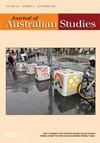澳大利亚:一个新的政治地理?
IF 0.5
3区 历史学
Q3 AREA STUDIES
引用次数: 0
摘要
19世纪90年代,澳大利亚联邦的一些最雄辩的倡导者认为,正如首任总理埃德蒙·巴顿所说,没有什么比“一个国家为一个大陆,一个大陆为一个国家”更自然的了。正如实现联邦的艰难过程所揭示的那样,现实要复杂得多。殖民地和各州之间的差异真的很重要。南北之间,东西之间在经济,政治,生理和心理上都存在着鸿沟。最重要的是,白人澳大利亚的移民理想忽视了土著居民的归属,只有通过排除亚洲和太平洋民族才有意义。这个讲座探讨了巴顿所想象的国家最近的转变,这种转变可能会让他和其他联邦创始人感到沮丧。这场大流行提醒澳大利亚人,软边界可能很快就会变得强硬,各州之间的差异仍然很重要,州和地区政府以澳大利亚人忽视或低估的方式融入了日常生活。与此同时,土著主权对定居者主权和民族空间的传统理解提出了另一种挑战。澳大利亚人,无论是移民还是土著,都接受了一门速成课程,学习由第一民族居住的新政治地理,每个民族的名字和国家都得到越来越多的认可,每个民族都有自己自豪地称之为自己的文化、语言和故事。本文章由计算机程序翻译,如有差异,请以英文原文为准。
Australia: A New Political Geography?
Some of the most eloquent advocates of Australian Federation in the 1890s imagined that there was nothing more natural than “a nation for a continent and a continent for a nation”, as the first prime minister, Edmund Barton, put it. The reality was more complicated, as the difficult process of achieving Federation revealed. Differences between colonies, and then states, really mattered. There was a gulf between north and south, east and west that was economic, political, physical and psychological. Above all, the settler ideal of a White Australia ignored Indigenous belonging and was made meaningful only through exclusion of Asian and Pacific peoples. This lecture explores recent transformation of the nation imagined by Barton into something that would likely have dismayed him and fellow Federation founders. The pandemic reminded Australians that soft state borders could quickly turn hard, that differences between states still mattered, and that state and territory government was embedded in everyday life in ways Australians had overlooked or underestimated. Meanwhile, Indigenous sovereignty offered a different kind of challenge to conventional understandings of settler sovereignty and national space. Australians, settler and Indigenous, have received a crash course in a new political geography inhabited by First Nations peoples, each increasingly recognised by name and Country, and each with culture, language and stories it proudly calls its own.
求助全文
通过发布文献求助,成功后即可免费获取论文全文。
去求助
来源期刊

Journal of Australian Studies
Multiple-
CiteScore
0.90
自引率
20.00%
发文量
56
期刊介绍:
The Journal of Australian Studies (JAS) is the journal of the International Australian Studies Association (InASA). In print since the mid-1970s, in the last few decades JAS has been involved in some of the most important discussion about the past, present and future of Australia. The Journal of Australian Studies is a fully refereed, international quarterly journal which publishes scholarly articles and reviews on Australian culture, society, politics, history and literature. The editorial practice is to promote and include multi- and interdisciplinary work.
 求助内容:
求助内容: 应助结果提醒方式:
应助结果提醒方式:


